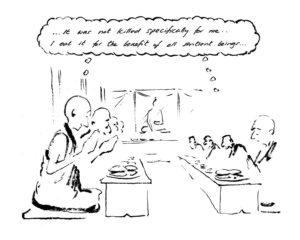Definition of the Week (44): The Perfection of Wisdom
Jetsun Chokyi Gyaltsan:
The definition of the perfection of wisdom is: A transcendental wisdom that has gone beyond and is distinguished by three qualities.
Definition Key
- The quality of the basis – it exist only in the continuum of buddhas.
- The quality of aspect – it is a non-dual transcendental wisdom.
- The quality of being free from the object of negation – it is illusory-like, empty of true existence.
Four-fold Nominal Division:
- Natural Perfection of Wisdom – i.e., emptiness.
- Textual perfection of wisdom – e.g., the small, medium and great Perfection of Wisdom Sutras.
- Path perfection of wisdom.
- Resultant perfection of wisdom.
The natural perfection of wisdom is cognised by relying on the textual perfection of wisdom. By meditating on the thus realized path perfection of wisdom one manifests the resultant illusory like non-dual transcendental wisdom gone beyond the two obscurations.
Reg. ‘perfection’: The Sanskrit word ‘paramita’ means literally ‘gone beyond’, or ‘going beyond’, whereby Lama Tsong Khapa and his students identified the first as the final meaning.
The ‘perfecting’ of generosity and so forth lies therefore in their ‘going beyond’, for which they need to be combined with the wisdom realizing emptiness.
The Buddha said in the 8000 Verse Perfection of Wisdom Sutra that what bodhisattvas lacking the perfection of wisdom cannot achieve over thousands of eons, a bodhisattva with the perfection of wisdom can achieve in one day.
Also:
8000 Verse Perfection of Wisdom Sutra: Chapter 29: Ensuing Knowledge
Subuti, further, the bodhisattvas, the great sattvas, should generate ensuing knowledge of the perfection of wisdom in this way:
- Because all phenomena lack attachment they should consequently be known as the perfection of wisdom.
- Because all phenomena are not divided they should consequently be known as the perfection of wisdom.
- Because all phenomena lack arising they should consequently be known as the perfection of wisdom.
- Because all phenomena are equal in lacking change they should consequently be known as the perfection of wisdom.
- Because all phenomena are consequently realised be wisdom as lacking self and as lacking a knower of aspects, they should consequently be known as the perfection of wisdom.
- Because all phenomena are expressed be mere name and through mere imputation they should consequently be known as the perfection of wisdom.


